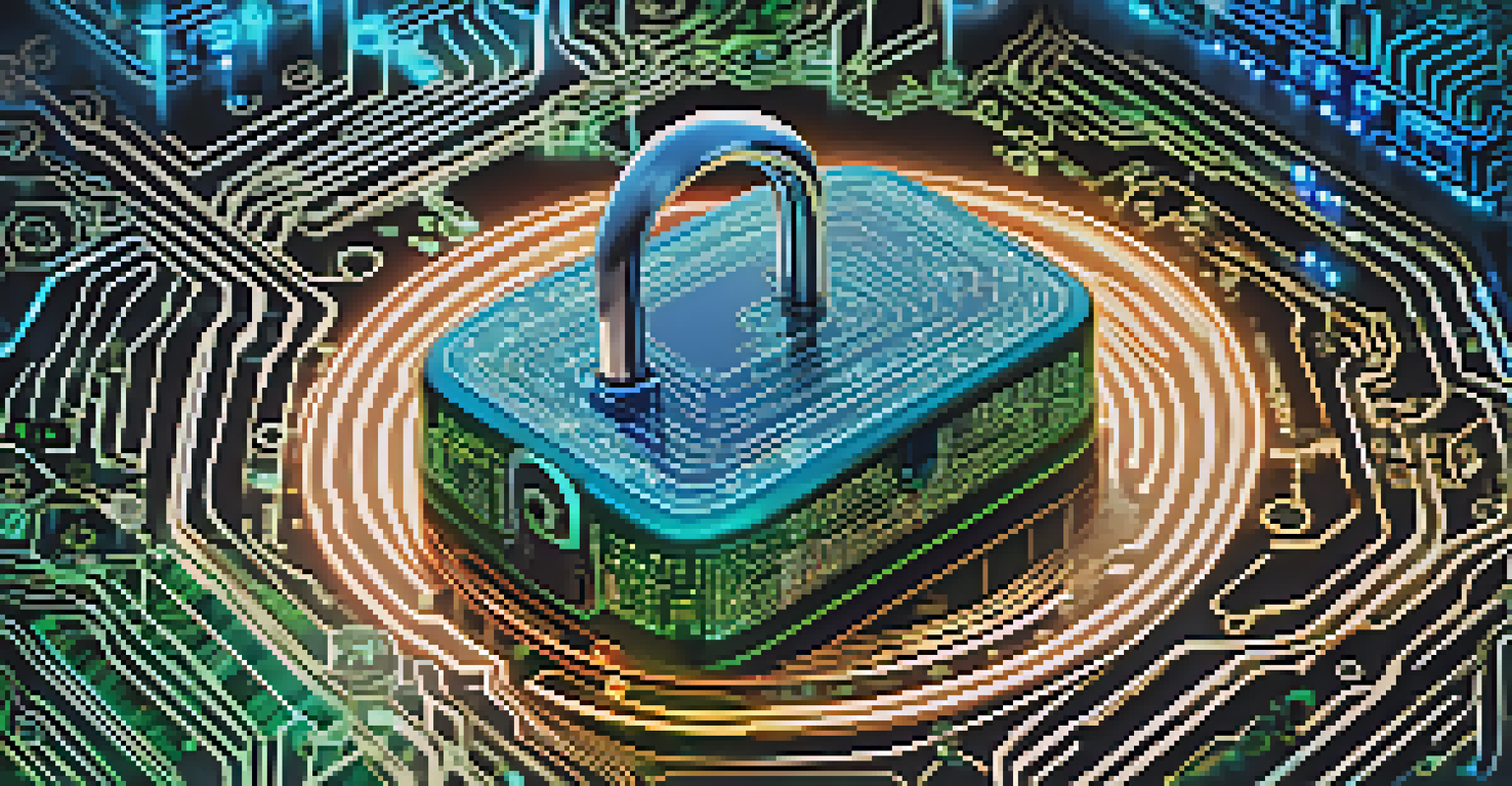The Role of Smart Contracts in Decentralized Data Storage

Understanding Smart Contracts and Their Functionality
Smart contracts are self-executing contracts with the terms of the agreement directly written into code. They operate on blockchain technology, which means they are immutable and transparent. This functionality allows for automated execution of actions once predetermined conditions are met, reducing the need for intermediaries.
Smart contracts are just like a vending machine; they execute automatically once the conditions are met, ensuring trust and efficiency.
For example, think of a vending machine: you insert money, select a product, and the machine delivers it without needing a cashier. Similarly, smart contracts handle transactions automatically, ensuring trust and efficiency in various applications, including data storage.
By removing human intervention, smart contracts minimize the risk of errors or fraud, making them a reliable option for managing agreements in decentralized systems.
Decentralized Data Storage: What Is It?
Decentralized data storage refers to a distributed network where data is stored across multiple locations instead of a single central server. This approach enhances data security and availability, as there is no single point of failure. Users have more control over their data, which is critical in an age where privacy concerns are at an all-time high.

Imagine a library where each book is stored in a different location, rather than all in one building. This method not only protects the books from being lost in a fire but also allows for easier access from various points.
Smart Contracts Automate Transactions
Smart contracts eliminate the need for intermediaries by automating transaction processes, enhancing efficiency and reducing costs.
By leveraging decentralized storage solutions, users can enjoy increased resilience and flexibility while maintaining control over their information.
How Smart Contracts Enhance Data Security
One of the standout features of smart contracts is their ability to enhance security in decentralized data storage. They ensure that data can only be accessed or modified when specific conditions are met, acting like a digital lock and key. This significantly reduces the chances of unauthorized access or tampering.
Blockchain technology is the backbone of smart contracts, enabling transparency and security in data transactions.
For instance, if a healthcare provider wants to share patient records, a smart contract can stipulate that only verified personnel can access that data under certain conditions. This level of control is crucial in sensitive fields like healthcare, finance, or legal services.
Thus, by using smart contracts, organizations can safeguard their data while still enabling necessary access, ensuring both security and compliance.
Efficiency Boost: Automating Processes with Smart Contracts
Smart contracts streamline processes within decentralized data storage by automating routine tasks. This means that actions such as data retrieval, verification, or sharing can happen without manual input, saving time and reducing administrative burdens. The result? Increased operational efficiency.
Consider a scenario where a company needs to verify the authenticity of data before sharing it. With a smart contract, this verification can be done automatically when specific criteria are met, eliminating delays and enhancing productivity.
Enhanced Security with Smart Contracts
By controlling access through specific conditions, smart contracts provide a digital lock and key mechanism that safeguards sensitive data.
This automation allows teams to focus on more strategic tasks instead of getting bogged down by repetitive processes, ultimately driving better business outcomes.
Cost Reduction Through Eliminating Intermediaries
By utilizing smart contracts in decentralized data storage, organizations can significantly reduce costs. Traditional data storage solutions often involve multiple intermediaries, such as data brokers or cloud service providers, which can lead to high fees. Smart contracts eliminate the need for these middlemen, allowing for direct peer-to-peer interactions.
Think of it like buying a home directly from the owner instead of going through a realtor; you save on commissions and fees. Similarly, smart contracts facilitate direct transactions between parties, minimizing costs and maximizing value.
This cost-effectiveness makes decentralized data storage an attractive option for businesses looking to optimize their budgets while maintaining quality.
Ensuring Transparency in Data Transactions
Transparency is another key benefit of integrating smart contracts into decentralized data storage. Each transaction is recorded on the blockchain, providing an immutable and publicly verifiable ledger. This enhances trust between parties, as everyone can see the history of data transactions without the risk of manipulation.
Imagine a shared cooking recipe where everyone can see the changes made over time. This transparency ensures that all contributors are recognized and accountable for their input, similar to how smart contracts operate.
Decentralized Storage Ensures Transparency
The use of blockchain technology in decentralized data storage provides a transparent and immutable record of transactions, fostering trust among parties.
As a result, organizations can foster a culture of trust, which is invaluable in collaborative environments where data integrity matters.
Real-World Applications of Smart Contracts in Data Storage
There are numerous real-world applications of smart contracts in decentralized data storage that are reshaping industries. For instance, in the supply chain sector, companies are using smart contracts to track the provenance of products. Each step of the journey is recorded, ensuring authenticity and compliance.
Another example can be found in the realm of digital identity verification. Smart contracts can securely manage personal data, allowing users to selectively share their information while maintaining control over who accesses it.

These applications not only improve efficiency and security but also pave the way for innovative solutions that can transform entire industries.
The Future of Smart Contracts in Decentralized Data Storage
Looking ahead, the role of smart contracts in decentralized data storage is expected to grow exponentially. As technology evolves and more organizations recognize the benefits, we can anticipate broader adoption across various sectors. Innovations in blockchain technology will likely enhance the capabilities of smart contracts, making them even more powerful tools for data management.
Consider the evolution of smartphones—once a luxury, they are now integral to our daily lives. Similarly, as awareness and understanding of smart contracts increase, they will become standard practice in data storage.
In conclusion, the future looks bright for the intersection of smart contracts and decentralized data storage, promising enhanced security, efficiency, and transparency.